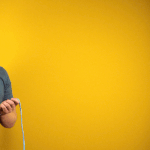20+ year standup, accredited road dog, and late-night appearance veteran Gary Gulman just released his new standup special It’s About Time on Netflix to great reviews. Although Gulman is not yet a household name, he has worked for two decades to accumulate both a loyal nationwide fan base and the utmost respect from his comedy peers. His style is meticulously crafted, yet exploratory; absurd, but with an approachable everyman quality. He’s also a dyed-in-the-wool standup, choosing comedy over everything else. “I know there’s one thing that I’m better at than every other thing in my life and that’s writing jokes and performing them.” I had an in-depth chat with Gulman about his new special, his intense writing process, and finding inspiration in Bruce Springsteen.
You came out of Boston, then went to LA for a little bit and discovered that it wasn’t really for you, right?
I was there for six years, so it wasn’t that brief. I found that it wasn’t really helpful for my standup. I didn’t get on stage… there was one year where I got on stage more on The Tonight Show than I did at the Laugh Factory. It was humbling. It wasn’t that I was mad at the Laugh Factory. It’s just that they had such big names and stars that came through there and there weren’t that many spots to hand out. It was difficult to get on stage in Los Angeles. I made do doing bar shows, coffee shops, and laundromats. I spent more time in acting class than I did on stage doing standup. I improved as an actor, but not as much as a standup comedian because I didn’t get the repetition in LA. In New York I can do 14-15 spots in a week without breaking a sweat.
How long had you been in the game before you moved to LA?
Probably about six or seven years.
So you were far enough along to know that you had a voice and that you could hold it down on stage. Arriving in LA had to feel like a bit of a hit.
Well, it was lucrative because it was during a time when they were giving out development deals to standup comedians. I got three or four development deals that helped pay my rent and allowed me to live a lifestyle that I hadn’t achieved in Boston. I was just making ends meet in Boston, living at home. The development deals allowed me to get my own apartment and my own car. But I wasn’t getting much standup. I tried to get standup to work on the road, but there wasn’t much interest. It was very depressing living out there and not being able to do very much standup. Luckily, my friend Dane Cook was there to take me on the road. That was really helpful. I was lucky in that respect.
A lot of people know you as a road comic. You tour extensively. When did that aspect of your career start to take off?
I would say ever since Last Comic Standing in 2004. Some years have been better than others, but I have been able to make my living off of the road. I love doing clubs and small theaters, an hour, an hour and 15-minute sets. I’ve been fortunate to be able to ply my wares on the road for about 10 or 11 years now.
In the 20-plus years that you’ve been doing standup, how do you feel that comedy has changed?
It’s much more common for comics to be known as standup comedians before they’re known for other things. Many times they are known for other things and after they are known as standup comedians. The amount of internet access and national radio shows that feature standup comedians, and just the ability to share standups that you like with your friends… it’s become more democratic. It’s become easier to be known as a standup comic without the TV show or the movie career. That’s been really helpful for comedians like me. I don’t have as big of an audience as Louie or Jim Gaffigan, but I am able to sell between 300 and 500 tickets in just about every city in the country, which is something I don’t think would have been available to me when I first started in 1993.
You seem to stay true to primarily being a standup. So many comics – for lack of a better term – diversify their portfolios with writing, producing, web series, podcasts, etc. They’re really spreading out because that is what is required for comics to make it right now. Do you plan on sticking mostly to just standup or have you given consideration to getting into other areas of comedy like acting or writing?
I would love to diversify and get opportunities for television and film auditions. I just don’t get a lot of those opportunities. I don’t have a theatrical agent. It’s not something that I’ve avoided. It’s just something that hasn’t come around. I know there’s one thing that I’m better at than every other thing in my life and that’s writing jokes and performing them. I’m comfortable there and it’s been rewarding in a number of ways. Psychologically it’s very therapeutic for me to get on stage every night and get my ideas out there. If I had ideas burning in my brain that I had to get out for a TV show or movie, I think I would be diligent about getting him out there. But I’m not a person who has a lot of ideas outside of standup. When I plan my day it’s always around getting some work done and writing for my standup act. That’s a full-time job for me. I admire these guys who can multitask and do a lot of different things like write for a show and work on standup and keep all that going. But my brain isn’t wired to take on all those projects at once. The one that I really love is my act because it’s going to keep on continuing to improve. A lot of people do specialty shows. “Tonight we’re going to roast each other” “Tonight we’re going to…” I just find it so hard to write for my act. I’m really impressed by people who can generate material so quickly. I’m not afraid to expand. I just find what I’m doing to be incredibly difficult and requiring most of my time and energy.
The focus and the work that you put into your standup is really apparent. You’re often mentioned as one of the “comics you should know.” I just saw an article recently listing the best comedy specials on Netflix. Your new special was on there and it had just come out.
That was really cool. I don’t know how that happened, but it was a really big compliment.
The first time I saw you was on one of your late-night appearances. So many comics, when asked to do a tight five for TV, pack as many jokes in as possible. But you came out and did a more long-form, conceptual bit. You had a cool, casual delivery, while at the same time giving off the impression that you were working this all out in your head live in front of the audience. I thought it was an interesting choice for a late-night set. But even though you do longer bits with unique story arcs, I like your simplicity of word choice at times. In the new special you talk about buying a movie online because you don’t want to get out of bed to get the DVD that you already own and put it in the player. Your brother gives you shit about it and says, “Hey that $15 really adds up.” Your response to him is, “It only adds up if you add it up.” That’s such a brilliantly simple statement. It seems like it should have been an adage commonly used for the last couple hundred of years. But you found it and made it a great punchline.
I saw this documentary that Bruce Springsteen put together about making Born to Run. You could tell from the documentary that he concerned himself with every single note on that album. Not just every word or every song, but every single note from every instrument. It took him months just to put together the song Born to Run. If I have a joke and I don’t go over every single word and every single sentence, I feel like I’m being lazy. That’s the thing about my process, I go over every word in every sentence over time. I work it out one way and then adjust the variables and expand on certain words and areas. Every once in a while you luck out and say something that should have been said before. You Google it to make sure it hasn’t been said before or hasn’t been said in exactly that way and if it hasn’t, that’s a gift.
When the special started I noticed it had a different look and feel, aesthetically. I looked up the credits and saw that Bobcat Goldthwait helped produce it. How much of the special’s style came from your input?
I would give 100% of the credit for the look of the special to Bobcat Goldthwait and the guys at Apostle. I have no idea where to put the cameras or how to light it. I just know how to tell the jokes. I chose my outfit, but everything else in the special I unofficially delegated to those guys.
The title is It’s About Time. Is that a reference to how long it’s been since your last special or the amount of time that you’ve been accumulating this material?
Yeah, it’s about how long it took me to make this special after my last one. The last one came out in 2012. I had a new hour by the end of 2013, so it took another two years to shoot it. I worked on it, added things, and made it better. I’m glad it took as long as it took. So that was one of the reasons I called it It’s About Time. The other thing is that when I shot it I’d been doing this for almost exactly 20 years. I thought it was important to acknowledge that I’m better than I was five years in, ten years in. Comedians, when referring to their act, talk about how much time they have. You have to have 60 minutes, which is not easy to do these days because so many other comedians talk about things. You have to remain original and really pick the issues that you’re going to talk about. The time spent generating that material is really hard. It’s really just been in the last couple of years that I’ve been recognized more as a comedian. Part of me goes, “I’ve been the same comedian for years now. Why did it take so long?”




